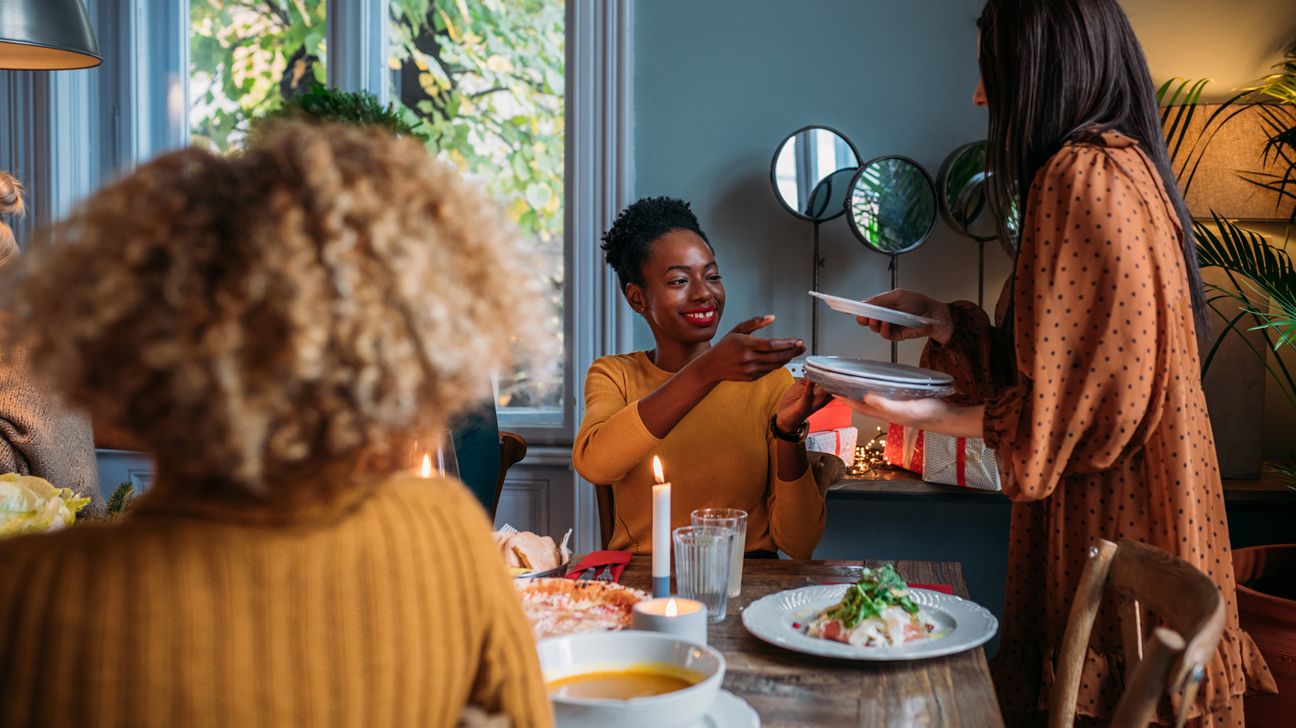5 Tips for Enjoying Holiday Meals with IBD and a Restricted Diet
November 08, 2021
Content created for the Bezzy community and sponsored by our partners. Learn More

Studio Firma/Stocksy United
It can be hard to stick to an IBD-friendly diet when holidays revolve around food. But there are steps you can take to stress less and enjoy the season.
The holiday season is such a fun time, but it can certainly be stressful for those of us living with inflammatory bowel disease (IBD).
So many holiday events are centered around food. Eating rich holiday food and dessert that we do not normally eat in daily life may trigger symptoms of Crohn’s disease and ulcerative colitis, making the holidays more difficult to enjoy.
I tend to stick to a paleo-ish diet (mostly grain-free and dairy-free) to help manage my Crohn’s disease. While I’m not as strict as I used to be with my diet, I find that choosing less processed, whole foods without additives helps me feel my best. (Of course, there isn’t one diet that works for everyone with IBD. What’s a trigger for me might not be for you.)
I can definitely recall many holidays when I didn’t feel well after eating and had to make emergency stops on the way home.
Luckily, you can still enjoy the holidays when you have a restricted diet. Here are some tips to make it easier.


1. Scope out the scene
Find out what’s being served at the holiday meal, determine what you can eat, and ask how you can help.
If you’re hosting, you have full control over the menu and can cook dishes to your liking. If you’re a guest, you can respectfully ask what the host is thinking about preparing and find out what you can do to support the host.
2. Bring dessert to share
Dessert is something that always tempts me over the holidays, and it very much triggers my Crohn’s symptoms if I eat all the gluten, refined sugar, and dairy in traditional desserts.
I always bring a paleo or gluten-free/dairy-free dessert to share. My friends and family love my desserts, and they are usually the first at the dessert table to go.
A few favorites are decadent paleo chocolate cake, SCD peanut butter cookies, vegan paleo chocolate cupcakes, paleo chocolate chip cookies, and paleo apple crisp.
3. Bring sides to share
Casseroles are common holiday dishes. They can be full of cream, butter, breadcrumbs, and other ingredients that might not be advised if you’re following a restricted diet.
To avoid this problem, you can offer to bring side dishes to share that you can enjoy. My family and I love roasted veggies, roasted potatoes, and this brussels sprouts medley with butternut squash and pomegranate.
4. See if the host can set aside plain veggies for you
One really wonderful thing that my relatives do is set aside boiled potatoes for me before mashing the potatoes with butter and milk. They also make plain vegetables for me before adding any butter or cheese to them.
It’s one small act of kindness on their end that makes a huge difference for me.
If you feel comfortable, kindly ask if the host would be willing to set aside any plain vegetables or a potato for you. Or ask if it would be OK to bake or warm up a sweet potato or squash.
Express gratitude, and remember that the host is probably already overwhelmed with cooking for a crowd.
5. Get help if you can
If cooking around the holidays stresses you out, and you can afford it, try a meal service, catering company, or restaurant.
Sometimes, paying for convenience is worth it for your emotional and physical health.
The bottom line
Remember, you did not choose to develop IBD, and it’s not your fault that food can make you feel sick. It’s completely your choice if you choose to eat what everyone else is eating during the holidays, or if you choose to stick closer to your “typical” diet.
Feel confident in your food choices, and try not to take it to heart if others judge or make comments about your food choices.
Sometimes, I “cheat” on my diet over the holidays, and sometimes I don’t. There have been holidays when I’ve eaten off-diet and felt terrible after, and other times I have been fine. Sometimes I develop symptoms when I eat perfectly “compliant” foods, and sometimes I feel great. It can be a gamble.
Be confident with your food choices, try not to stress, and do everything you can to have a happy holiday season.
Article originally appeared on November 8, 2021 on Bezzy’s sister site, Healthline. Last fact checked on November 4, 2021
Fact checked on November 08, 2021


Like the story? React, bookmark, or share below:
Have thoughts or suggestions about this article? Email us at article-feedback@bezzy.com.
About the author